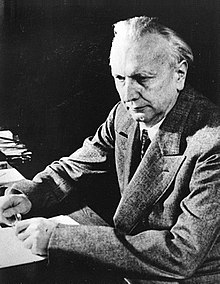Karl Jaspers
| Karl Jaspers | |
|---|---|

Karl Jaspers in 1946
|
|
| Born |
23 February 1883 Oldenburg, Germany |
| Died | 26 February 1969 (aged 86) Basel, Switzerland |
| Alma mater |
University of Heidelberg (MD, 1908) |
| Era | 20th-century philosophy |
| Region | Western Philosophy |
| School |
Neo-Kantianism (early) Existentialism (late) Existential phenomenology (late) |
|
Main interests
|
Psychiatry, theology, philosophy of history |
|
Notable ideas
|
Axial Age; coining the term Existenzphilosophie; Dasein and Existenz as the two states of being, subject–object split (); theory of communicative transcendence |
|
Influences
|
|
Karl Theodor Jaspers (German: [ˈjaspɐs]; 23 February 1883 – 26 February 1969) was a German-Swiss psychiatrist and philosopher who had a strong influence on modern theology, psychiatry, and philosophy. After being trained in and practicing psychiatry, Jaspers turned to philosophical inquiry and attempted to discover an innovative philosophical system. He was often viewed as a major exponent of existentialism in Germany, though he did not accept this label.
Jaspers was born in Oldenburg in 1883 to a mother from a local farming community, and a jurist father. He showed an early interest in philosophy, but his father's experience with the legal system undoubtedly influenced his decision to study law at University of Heidelberg. It soon became clear that Jaspers did not particularly enjoy law, and he switched to studying medicine in 1902 with a thesis about criminology. In 1910 he married Gertrud Mayer (1879–1974), the sister of his close friends Gustav Mayer and Ernst Mayer.
Jaspers earned his medical doctorate from University of Heidelberg medical school in 1908 and began work at a psychiatric hospital in Heidelberg under Franz Nissl, successor of Emil Kraepelin and Karl Bonhoeffer, and Karl Wilmans. Jaspers became dissatisfied with the way the medical community of the time approached the study of mental illness and gave himself the task of improving the psychiatric approach. In 1913 Jaspers habilitated at the philosophical faculty of the Heidelberg University and gained there in 1914 a post as a psychology teacher. The post later became a permanent philosophical one, and Jaspers never returned to clinical practice. During this time Jaspers was a close friend of the Weber family (Max Weber also having held a professorship at Heidelberg).
...
Wikipedia
